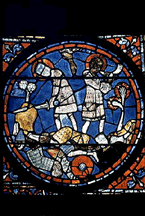©1997, 2008 by Joseph E. Price. Use permitted with appropriate citation.
 Serments de Strasbourg. Old French text with Modern English and French translations.
Serments de Strasbourg. Old French text with Modern English and French translations.
 Serments de Strasbourg. Shows the Oaths in the context of Nithardus' History of the Sons of Louis the Pious.
Serments de Strasbourg. Shows the Oaths in the context of Nithardus' History of the Sons of Louis the Pious.
 Serments de Strasbourg. Old French text with Modern English and French translations.
Serments de Strasbourg. Old French text with Modern English and French translations.
 Serments de Strasbourg. Facsimile of manuscript, Old and Modern French texts, links.
Serments de Strasbourg. Facsimile of manuscript, Old and Modern French texts, links.
 Serments de Strasbourg.
From
Bibliotheca Augustana. In old French, no translations.
Serments de Strasbourg.
From
Bibliotheca Augustana. In old French, no translations.
 La Cantilène de Sainte Eulalie. Includes photos the MS.
La Cantilène de Sainte Eulalie. Includes photos the MS.
 La Cantilène de Sainte Eulalie. Old & Modern French texts, facsimile of manuscript, links.
La Cantilène de Sainte Eulalie. Old & Modern French texts, facsimile of manuscript, links.
 La Cantilène de Sainte Eulalie. In OF and English.
La Cantilène de Sainte Eulalie. In OF and English.
 La Cantilène de Sainte Eulalie.
From
Bibliotheca Augustana.In old French, no translations.
La Cantilène de Sainte Eulalie.
From
Bibliotheca Augustana.In old French, no translations.
 La Cantilène de Sainte Eulalie.
Pdf file version of the text. In old French, no translations.
La Cantilène de Sainte Eulalie.
Pdf file version of the text. In old French, no translations.
 La Chanson de Roland In OF and English.
La Chanson de Roland In OF and English.
 La Chanson de Roland.
From
Bibliotheca Augustana. In old French, no translations.
La Chanson de Roland.
From
Bibliotheca Augustana. In old French, no translations.
 La Chanson de Roland.
Pdf file version of the text. In old French, no translations.
La Chanson de Roland.
Pdf file version of the text. In old French, no translations.
 La chanson de Roland, voice file. Contains an extract of the text, read in Old French.
La chanson de Roland, voice file. Contains an extract of the text, read in Old French.
 The Song of Roland.
Roland in English.
The Song of Roland.
Roland in English.
 The Song of Roland. English translation of the Chanson de Roland.
The Song of Roland. English translation of the Chanson de Roland.
 La Vie de Saint Alexis.11th Cent., Old French.
Transcription and Translation by Joseph E. Price. English translation in progress.
La Vie de Saint Alexis.11th Cent., Old French.
Transcription and Translation by Joseph E. Price. English translation in progress.
 La Vie de Saint Alexis.
Original text, but no translation.
La Vie de Saint Alexis.
Original text, but no translation.
 La Vie de Saint Alexis.
Pdf file version of the text. In old French, no translations.
La Vie de Saint Alexis.
Pdf file version of the text. In old French, no translations.
 La Vie de Saint Léger. Late Tenth Century Old French text.
Transcription and Translation by Joseph E. Price.
La Vie de Saint Léger. Late Tenth Century Old French text.
Transcription and Translation by Joseph E. Price.
 La Vie de Saint Léger.
From
Bibliotheca Augustana. In old French, no translations.
La Vie de Saint Léger.
From
Bibliotheca Augustana. In old French, no translations.
Go to Old French Language Home Page
Go to Literature Index
